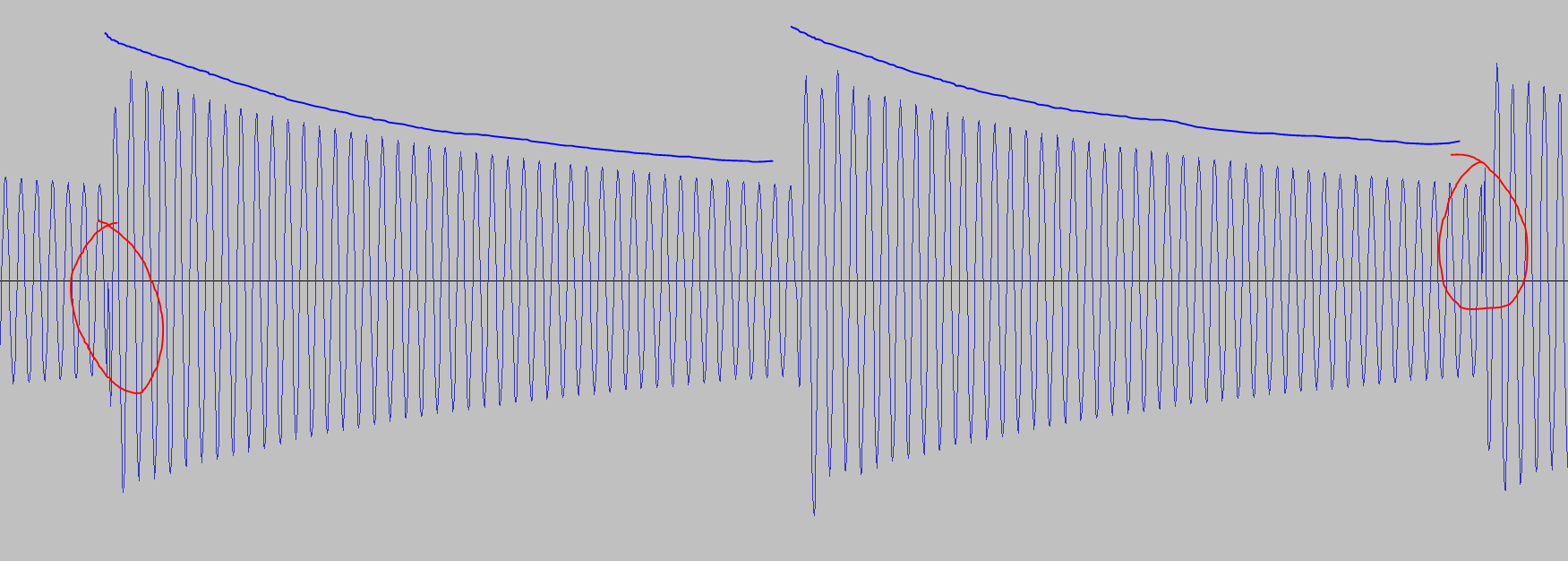hardware engineer here dipping his toes into software DSP and running into some issues.
I'm attempting to demodulate in realtime a simple narrowband FM signal with samples from an RTL-SDR, and play the resulting audio through my speakers.
My Sampling Approach
The way my code is set up currently, I have a Python sounddevice running at an audio sample rate of 24khz which makes a call to my getSamples() function every time it needs new audio samples to play. My SDR is sampling at 240khz which gives me a nice even decimation factor of 10 to get to my audio rate. I'm processing 10,000 RF samples at a time in this callback, which means I'm giving the audio device 1000 samples at a time.
The getSamples() function is actually pretty large and contains some calls to UI objects to things like RSSI bars, but below is a slimmed-down version containing only the relevant demodulation code to get from baseband to NFM audio. The FM demod algorithm was borrowed from this post.
(sig is the scipy.signal module and np is numpy)
#########################################
# Main Sample Processing Routine
#########################################
# Read samples
samples = self.sdr.read_samples(RadioSamplesPer)
# Decimate samples before audio processing
baseband = sig.decimate(samples,int(Decimation))
# FM Demod #
if self.mode == "NFM":
# Filter RF baseband (lowpass at 5khz)
filtered = Filters.LP_NFM_RF(baseband, AudioSampleRate)
# Add in the last sample from the previous block for "history"
baseband = np.insert(baseband, 0, self.lastSample)
# Compute phi from the complex sample
phi = np.arctan2(np.imag(baseband), np.real(baseband))
# Demodulate by taking the difference between each sample
outputSamples = np.diff(np.unwrap(phi)/(2*np.pi*0.1))
# Get the new last sample
self.lastSample = baseband[AudioSamplesPer]
# Filter Audio (Bandpass at 300-3000khz)
outputSamples = Filters.BP_NFM_AUD(outputSamples, AudioSampleRate)
# Deemphasis Filter (RC filter with R=50 and C=4uF)
outputSamples = Filters.LP_RC(outputSamples, 50, 4e-6, AudioSamplesPer)
# Clip to (-1,1)
outputSamples = np.clip(outputSamples,-1,1)
# Return the samples
return outputSamples
This seems to be generally working. I can get real-time demodulated audio, and it sounds correct, but it's not perfect. I can hear an audible click every time a new sample block is processed, which is both annoying and a sign that things aren't working quite right. Below is an annotated capture of a demodulated 1kHz tone coming from my demodulation routine (click for full size).
Issue 1 (red): Sample Jumps Between Blocks
Every other sample block, I'm seeing discontinuities at the transition point between blocks. Originally, I was seeing this issue between every block, but adding in the "history" for the FM demodulator seen in the above code cut that in half.
I'm assuming this issue stems from the demodulator not knowing what is coming in the next sample block. The fact that it got better when adding "history" seems to indicate I'm on the right track. But my non-DSP background isn't helping me to figure out where to go next.
Issue 2 (blue): Strange Output Envelope
This is the other strange issue causing the clicking between sample blocks. For some reason each sample block has a decaying output envelope instead of a constant envelope like I would expect with a solid 1kHz tone. Perhaps one of my filters is causing this unintentionally? It's a time-domain artifact, so I wouldn't think that would be the case.


